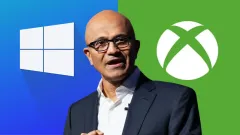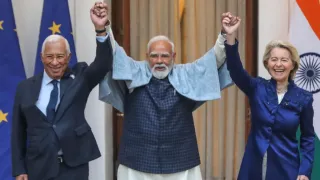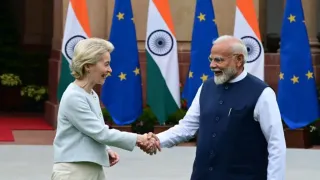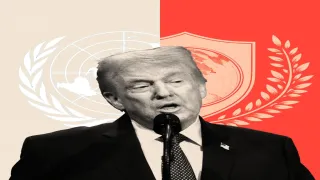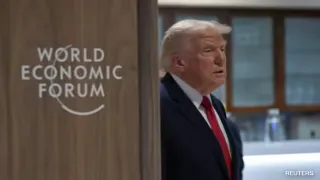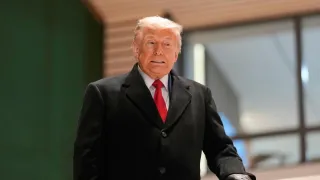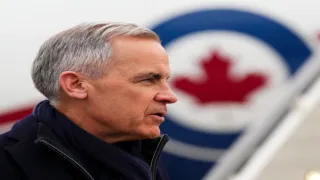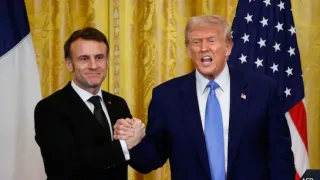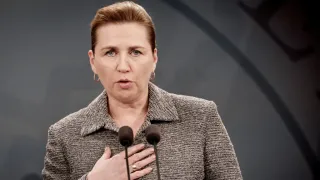The political atmosphere in the United States has once again ignited with intensity after Donald Trump’s remarks on Zohran Mamdani’s mayoral victory in New York City. The former president, never one to hold back his opinions, voiced both caution and criticism as the city welcomed its newly elected leader. His comments carried a mix of begrudging optimism and biting rhetoric—an approach that perfectly captured the ongoing tension between Washington and New York’s evolving political tone.
As the 34-year-old Zohran Mamdani celebrated his landmark victory with supporters in Brooklyn, Trump’s reaction came swiftly. While he expressed affection for New York and claimed he wished for Mamdani’s success, his words also carried a stark warning. Trump emphasized that the mayor-elect should prioritize a cooperative relationship with the federal government or risk facing “consequences.” His statement was not merely political—it was personal, charged with history, rivalry, and a deep undercurrent of ideological conflict.
Trump’s Mixed Message: Praise, Warning, and Accusation
Speaking to reporters from Fox News, Donald Trump said he wanted to see Mamdani “do well,” reiterating that his love for New York remained unchanged. Yet, beneath this veneer of goodwill, Trump was quick to remind the new mayor that “he should be very nice” to the President of the United States, as much of New York’s federal funding and policy approvals would require Washington’s green light.
Trump’s statement balanced between mentorship and menace. He expressed nostalgia for a New York that, in his view, thrived before the era of “bad signs” under former mayor Bill de Blasio. Drawing a stark comparison, Trump remarked, “The bad sign was a guy named Bill de Blasio. The signs of de Blasio—that was the beginning, and it was bad. This one, we’re going to look for a thousand years. Communism has not worked.” The remark reignited his long-standing claim that progressive leadership trends in America are leading cities toward a “communist decline.”
“A Very Angry Speech”: Trump’s Reaction to Mamdani’s Victory Address
Trump’s criticism focused largely on the tone and content of Mamdani’s victory speech delivered in Brooklyn. The speech, which electrified supporters, was described by Trump as “very angry” and “unnecessarily combative.” He argued that instead of fostering unity, Mamdani’s rhetoric seemed to draw battle lines between New York City and Washington.
“I thought it was a very angry speech, certainly angry toward me,” Trump said. “He should be very nice to me as I am the one that sort of has to approve a lot of things coming to him, so he’s off to a bad start.” His remarks quickly spread across media outlets and social platforms, with supporters of both leaders debating whether Trump’s comments reflected constructive advice or veiled threats.
Mamdani’s Fiery Response and the Power of Defiance
During his speech, Zohran Mamdani did not shy away from addressing Trump directly. His bold statement, “To get to any of us, you will have to get through all of us,” drew cheers from his supporters, symbolizing defiance against what many perceive as Trump’s political intimidation. Mamdani further added, “I have four words for him: Turn the volume up,” a phrase that instantly trended online and became a rallying cry for his campaign’s movement.
For Mamdani’s base, this wasn’t merely about politics—it was about identity, resilience, and representation. His victory marked a generational and ideological shift in one of the world’s most influential cities. For many voters, especially the young and diverse, Mamdani’s rise signified a break from establishment politics and a push toward inclusivity and progressive reform.
A Record Turnout and a Political Earthquake
The New York City mayoral election witnessed a record turnout, with over two million citizens casting their votes. The contest wasn’t just local—it carried national implications. Mamdani, running as a Democrat, defeated an independent candidate backed by Trump and Elon Musk—former New York Governor Andrew Cuomo—as well as Republican nominee Curtis Sliwa.
The victory sent shockwaves across the political landscape, energizing Democrats and reshaping conversations around urban policy, immigration, and the role of diversity in governance. For Republicans, however, the loss was viewed as another indicator of the growing gap between conservative leadership and metropolitan America’s evolving values.
Trump’s Ideological Offensive: “Communism vs. Common Sense”
Following Mamdani’s victory, Trump escalated his rhetoric by labeling the new mayor a “communist,” reviving his long-running narrative about America’s ideological struggle. At a business event in Miami, Trump told attendees that the U.S. had “lost its sovereignty” after the election results in New York City. “The decision facing all Americans could not be more clear,” he declared. “We have a choice between communism and common sense.”
He further warned that New York would become an example of failed progressive policies and that Miami might soon serve as “a refuge for those fleeing communism in New York.” These statements, though hyperbolic to some, resonated strongly with Trump’s base, reinforcing his ongoing campaign to position himself as the defender of American capitalism and individual freedom.
Building Bridges or Burning Them: What Lies Ahead for NYC
Despite the firestorm, political analysts suggest there’s still room for cooperation. Trump’s remarks, though harsh, hinted at a pragmatic acknowledgment that New York’s progress benefits the nation as a whole. If both leaders find a way to engage constructively, the relationship between City Hall and Washington could shape crucial infrastructure, housing, and economic programs for years to come.
However, given the ideological divide and the early tone of confrontation, the path forward remains uncertain. Mamdani’s administration will have to navigate federal relationships carefully, balancing the expectations of his supporters with the realities of national politics. The success or failure of that effort could set the tone for how progressive city governments interact with conservative federal administrations in the future.
The Broader Implications: A Clash Beyond New York
This episode represents more than a personal feud—it’s a reflection of America’s cultural and political transformation. Trump’s comments serve as a microcosm of the broader national discourse: a tug-of-war between traditional power structures and emerging progressive voices. Mamdani’s assertive response, in turn, symbolizes a new generation unafraid to challenge established figures, even at the highest levels.
Whether this exchange marks the beginning of a new political rivalry or a fleeting war of words remains to be seen. But one thing is certain: both men understand the power of spectacle, the magnetism of strong rhetoric, and the importance of public perception. Their clash will likely continue to shape headlines—and perhaps the future direction of American politics—for months to come.
Conclusion: From New York to Washington, A New Chapter Begins
As the dust settles on the election, New York City stands at a crossroads. Zohran Mamdani enters office carrying both the hopes of millions and the scrutiny of powerful opponents. Donald Trump, ever the commentator on American destiny, has already framed this as a battle between ideologies and identities. Their unfolding dynamic will test not only political skill but also the resilience of democratic dialogue in a divided America.
For now, the message from both sides remains clear: one calls for cooperation, the other for defiance. Between them lies the future of New York’s governance—and perhaps a glimpse of where America itself is heading in its next chapter of political transformation.
Also Read: Indian Markets Today: 8 Overnight Updates You Must Know





